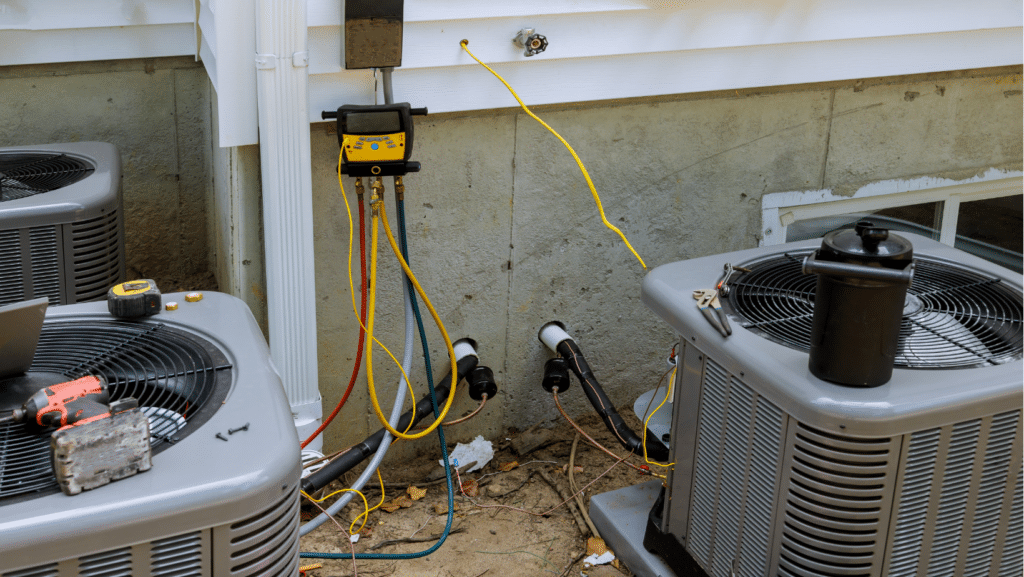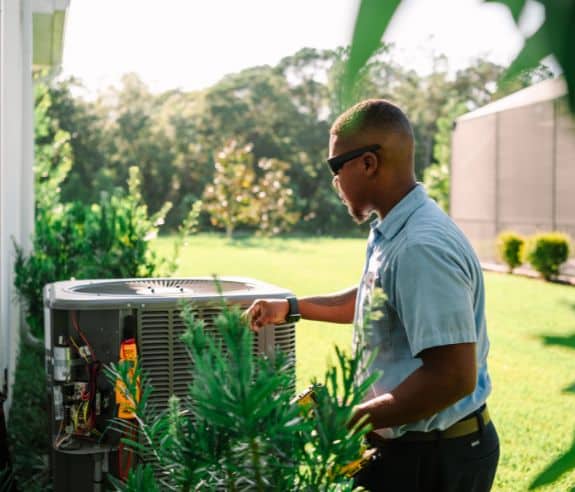Does your air conditioning operate on gas or electricity? You may have never thought about it until your unit stops working and you are debating over who to call. It might be a glance at a steep utility bill that’s making you wonder? Maybe you smell gas and are wondering where it’s coming from? (If that’s the case, evacuate your home immediately and reach out to your utility company from a safe place).
Here’s what you need to know about how air conditioners work and the role that gas plays.

How An Air Conditioner Works
Your AC demands the refrigerant, often called by a common type, “Freon.” It goes seamlessly from liquid to gas and back again. The refrigerant’s critical job is to absorb heat from your indoor air, transform it into a gas, and then dispose of the collected heat outside your home. In essence, your refrigerant is the ‘mover’ for heat from indoors to outdoors.
- The AC sucks in hot air from your home into its system.
- The heat from this air is absorbed by the refrigerant, initiating its transformation into a gas.
- The refrigerant, in its gaseous state, travels out to the AC’s external unit, where it disposes of its collected heat and turns back into a liquid.
- Finally, the cool air is then blown back into your home.
Do Air Conditioners Use Gas?
Does your home air conditioner use gas? Well, yes and no. Yes, in the sense that it uses a gas – but not the kind one would conventionally consider ‘gas’, like propane or natural gas. Instead, it uses Freon.
However, electricity is used to power the HVAC unit itself – its fans and internal components. So, when you switch on your air conditioning unit, it’s the electricity you are paying for, which in turn is used to carry out the cooling process with the help of the Freon gas.
Why Do I Hear About “Gas-Powered Air Conditioning”?
The term ‘air conditioning’, is essentially a catch-all for any method to modify the air in a space, making it more pleasant, whether you are cooling down warm air with an air conditioner or heating up cold air with a furnace.
Therefore, while air conditioners require electricity, temperature control may be achieved with both gas and electricity.
A furnace usually uses gas to generate heat to warm up your home. Some models also employ electric heat coils. After the air is warmed, it gets channeled through ducts, dispelling it throughout your house.
Here in Florida you probably have a heat pump for those short cold winter nights and is most likely ran on electricity.
Often, the terms “central air,” “central AC,” or “central air conditioning” are used interchangeably. However, ‘central air conditioning’ or ‘central AC’, distinctly indicates a refrigerant system where air is chilled in one central hub and dispersed throughout various home sections via the same ducts the heating system uses.
People may often mistakenly refer to ‘central air conditioning’ as ‘central air’, lending to a mix-up between central heating and cooling mechanisms.
There is also widespread misunderstanding centered around the notion of “recharging” the gas in AC units. The phrase ‘recharging‘ might make people think of powering the AC unit with gas, but it really refers to ensuring the unit has ample refrigerant.
The peripheral structure of AC units is designed to prevent any escape of the gas or refrigerant. Yet, with time, older models might develop leaks. As refrigerants can be toxic and detrimental to the environment, it’s of paramount importance to keep them properly contained.
This concern is one of the prime reasons prompting the switch from Freon to more eco-friendlier alternatives, with new rules coming in 2025 with the use of Freon.
Read more about how Millian Aire leading the way on the new refrigerant regulations coming in 2025.
Alternatives to Freon
Puron, also known as R-410A, doesn’t deplete the ozone layer. New HVAC units use Puron. It can also be used to replace the Freon in your existing system. It’s still important that your HVAC doesn’t leak for the efficiency of the system, but at least the consequences of a leak aren’t as damaging to the environment with Puron.
Manufacturers are also producing heat pump models that use propane or ammonia as refrigerants. Although not as common, these affordable and eco-friendly alternatives are gradually gaining traction.
Ask Millian Aire about Freon-free options. We’re happy to replace the Freon in your system, whether or not you have a leak. Not sure if you have a leak? We can find out for you.
Can Your Home Air Conditioning Be Gas-Powered?
A gas-powered home air conditioning unit relies primarily on natural gas for heating. However, it’s essential to clarify that these systems also require electricity. Although the furnace may run on gas, the condenser relies on electricity when the air conditioning is on.
In this “split” system, cooling is handled by an electrically powered air conditioner (to run the condenser), and heating is managed by a gas or propane furnace. You can use any suitable duct system with either one.
Carrier is a notable brand offering such hybrid heating, ventilation, and air conditioning (HVAC) units. Their standout product, the “Hybrid Heat” system, merges the power of a gas furnace with the convenience of an electric heat pump, sidestepping the need for a conventional air conditioner.
The heat pump cools the home but it also delivers efficient heating when the temperatures are moderate. As the temperatures drop, the system instinctively switches over to the furnace, providing robust heating.
Most homeowners opt to stick with electrically-powered furnaces and condensers for their HVAC systems. However, in some instances, like very cold temperatures that we don’t typically get around Tampa, a gas-powered furnace can save money by reducing operation time to achieve the same results.
| Gas Air Conditioners (Heating) | Electric Air Conditioners | |
|---|---|---|
| Pros | Provides powerful heating capacity during colder weather; highly efficient, resulting in potential cost savings on energy bills. | Consumes less energy; lower initial purchase cost; does not require a gas connection for installation. |
| Cons | Requires a gas line for installation; higher initial purchase cost; can be less efficient in moderate climates. | May not provide sufficient heating in extremely cold climates; may consume more energy for heating, increasing energy costs; depends on electricity availability. |
Do Heat Pump Air Conditioners Use Gas?
Now that we have debunked the myth regarding traditional air conditioning systems using gas, let’s talk about heat pump air conditioners. This is another kind of home cooling and heating system commonly used in mild climate regions like Tampa.
Air conditioning systems essentially function by utilizing energy to transfer warmth from an area of low temperature to one of high temperature. During colder seasons, these systems retrieve heat from the cooler external environment and bring it into your home. Conversely, in hotter seasons, they remove the accumulated heat from inside your home and disperse it into the warmer outdoors.
Heat pumps primarily rely on electricity, but there is a type of heat pump known as a gas-fired heat pump. Instead of using electricity it makes use of natural gas or another type of combustible fuel to extract heat from the air, ground, or water around it.
Gas-fired heat pumps are less common compared to their electrical counterparts because they typically cost more to run and aren’t as efficient.

Trust Millian Aire For All Your HVAC Needs
If you have questions about your current HVAC system or need help choosing an option that is both affordable and will last you for many years, reach out to Millian Aire for a free estimate. We offer everything you need to have a new system installed, repairs or maintained. We are dedicated to ensuring your comfort at home, regardless of the type of air conditioning system you choose.
Give us a call today or fill out our Contact Us form and we will be in touch.



